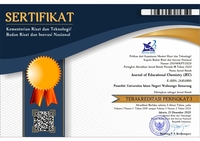Analysis of Ruangguru as the Online Learning Media on Chemistry Learning
DOI:
https://doi.org/10.21580/jec.2022.4.1.11313Keywords:
chemistry learning, , learning media, ruangguru, solubility, KspAbstract
Ruangguru is one of the leading online education platforms in Indonesia that has followed a learning system based on the applicable curriculum. There is a need for analysis to find out how capable the Ruangguru application is in supporting online learning activities. Therefore, this study aimed to know the process of learning chemistry in the Ruangguru online learning media, especially on the solubility product and solubility product constant (Ksp). The type of research used was descriptive qualitative. Data collection techniques used observation and documentation. The results showed that the Ruangguru application met the criteria in supporting the online learning system of solubility and solubility product constant (Ksp) materials, which had facilities with learning materials delivered via live streaming video with the guidance of online tutors. In addition, there were facilities that could support all student activities, such as the availability of study modules, study groups, and learning evaluations. These are in order to improve students understanding abilities and have a good impact on the learning outcomes obtained, which has facilities with learning materials delivered via live streaming videos with the guidance of online tutors.Downloads
References
Arikunto, S. 2010. Prosedur Penelitian Suatu Pendekatan Praktik. Jakarta: Rineka Cipta.
Dirman & Jurasih. 2014. Teori Pembelajaran dan Prinsip-Prinsip Pembelajaran yang Mendidik. Jakarta: Rineka Cipta.
Irwanto. 2017. Smartphone Use in High School Chemistry Learning. Holistik: Journal for Islamic Social Sciences, 2(1), 81-87.
Karwati, E. 2014. The Effect of Electronic Learning (E-Learning) on the Quality of Student Learning. Journal of Communication Research, 17(1), 41-54
Kemkominfo. 2014. Internet Users in Indonesia Reach 82 Million. Accessed on December 16, 2020 at the link https://kominfo.go.id/index.php/content/detail/3980/Kemkominfo%3A+User+Internet+di+Indonesia+Capai+82+Million/0/berita_satker.
Kuchler, O. 2016. Facebook Targets Share in Crowded Enterprise Software Market by Connecting Mobile Employees. United Kingdom: Financial Times.
Moleong, L. 2018. Metodologi Penelitian Kualitatif. Bandung: PT. Rosdakarya Youth.
Nasser, R. 2014. Using Mobile Device to Increase Student Academic Outcomes in Qatar. Open Journal of Social Sciences, 2, 67-73.
Choirunnisa, L 2012. Pengaruh Pembelajaran E-Learning Terhadap Hasil Belajar Mata Kuliah Statistics Mahasiswa Tadris Bahasa Inggris Fakultas Tarbiyah IAIN Walisongo. Phenomenon: Jurnal Pendidikan MIPA, 2(1): 7-27.
Oztekin, A., Delen, D., Turkyilmaz, A., & Zaim, S. 2013. A Machine Learning-Based Usability Evaluation Method for Elearning Systems. Decision Support System, 56, 63-73.
Podomi, V. V., Sumendap, S. S., & Runtuwene, A. 2019. Manfaat Penggunaan Search Engine untuk Sarana Belajar Siswa di Perpustakaan SMA Negeri 9 Manado. Acta Diurna Komunikasi, 7(3), 1-18.
Putrawangsa, S., & Hasanah, U. 2018. Integrasi Teknologi Digital dalam Pembelajaran Di Era Industri 4.0 (Kajian dari Perspektif Pembelajaran Matematika). Tatsqif Journal of Educational Thought and Research Journal, 16(1), 42-54.
Rahadian, D., Rahayu, G., & Oktavia, RR. 2019. Educational Technology: Study of Ruangguru Applications Based on Principles and Paradigms of Human and Computer Interaction. PETIK Journal, 5(1), 11-21
Seffah, A., Donyaee, M., & Kline, R. B. 2016. Usability Measurement and Metrics: A Consolidated Model. Software Qual J., 14, 159–178.
Sudiana, I. K., Sua, I. W. & Mulyani, I. 2019. Analysis of Students' Chemistry Learning Difficulties on Solubility and Solubility Products. Indonesian Journal of Chemistry Education, 3(1), 7-16.
Sundari, T. T. 2015. Effects of Mobile Phone use on Academic Performance of College Going Young Adults in India. International Journal of Applied Research, 1(9), 898-905.
Downloads
Published
How to Cite
Issue
Section
License
The copyright of the received article shall be assigned to the journal as the publisher of the journal. The intended copyright includes the right to publish the article in various forms (including reprints). The journal maintains the publishing rights to the published articles.
Authors are permitted to disseminate published articles by sharing the link/DOI of the article at the journal. Authors are allowed to use their articles for any legal purposes deemed necessary without written permission from the journal with an acknowledgment of initial publication to this journal.

This work is licensed under a Creative Commons Attribution-NonCommercial-ShareAlike 4.0 International License.


